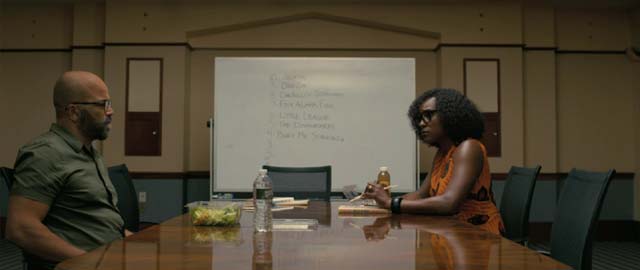
Rent American Fiction on Amazon Video (paid link) // Buy the book (paid link)
Written by: Cord Jefferson (written for the screen by), Percival Everett (novel)
Directed by: Cord Jefferson
Starring: Jeffrey Wright, Tracee Ellis Ross, Issa Rae, Sterling K. Brown, John Ortiz, Erika Alexander, Adam Brody, Keith David
Rated: R
Watch the trailer
Plot
A novelist who's fed up with the establishment profiting from Black entertainment uses a pen name to write a book that propels him into the heart of the hypocrisy and madness he claims to disdain.
Verdict
Mad that his books don't get published, Monk writes a pandering, trope filled book, giving the people what they want as a joke. He's even more mad when publishers are delighted with his work. No matter how outlandish his ideas, they love it. He sells out for a paycheck, but he's also upset that black stories are consolidated into a stereotype and then proclaimed as an authentic voice. Ironically, he gets the acclaim he wants but he's rewarded for his perceived black voice instead of the quality of his work. It's not that there aren't notable black writers, it's that the publishing industry only wants certain kinds of black stories.
Watch It.
Review
Professor and writer Thelonious "Monk" Ellison (Jeffrey Wright) hasn't published a book in a while, but it's not for a lack of trying. Publishers just aren't interested in his academic books. His agent encourages him to write a "black" book on cops, the ghetto, and murder. The school administration wants him to take time off as his class and the ideas explored make students uncomfortable.
 |
| Jeffrey Wright plays Thelonious "Monk" Ellison |
Monk is frustrated by a new popular book, We's Lives in the Ghetto. He catches a reading from author Sintara Golden (Issa Rae). The grammar is comically bad and that's the point. White people clamor over a poorly written stereotypical book that embodies their expectations as a means to claim they embrace culture and diversity. Monk can't get his book published because it's too good and doesn't have the right slang. Curious, he goes to a bookstore to find his books and they're in the African American studies section because the writer is black. You get it. He wants to be a writer, not a Black writer. Writing what he wants means his books end up on a bottom shelf. Writing something that panders to a white audience garners acclaim, but he's not passionate about it.
I love the concept. You want to do something great, meaningful, but something crass and indulgent pays the bills. While Monk writes a book that pushes the ghetto stereotype as a joke and his agent dismisses it, the publisher loves it. I like how this visualizes Monk writing his story and seeing his characters. We don't see much, but we see enough. When he's offered a large advance, he can't help but take it. Who wouldn't cash in given the chance? There's no accounting for taste. Monk laments that "the dumber my behavior, the richer I get." He keeps pushing the joke to see how far he can take it, and he meets no resistance. He's written a Black book the publishers want and want to believe. They don't want truth. The publishing world is ridiculous, and Monk can't help but push. Despite his shenanigans, they accept it.
 |
| Jeffrey Wright, Issa Rae play Thelonious "Monk" Ellison, Sintara Golden |
Monk is mad as his own success. He's mad that pandering brings success and money that 'good' books never did. Following his passion never brought acclaim. He takes his frustrations out on his girlfriend starting an argument and a breakup. He then ends up on a panel judging his own book her wrote under a pen name. He's surprised at how much people like it, well the white judges. Sintara is also on the panel, and she criticizes Monk's book. He wholeheartedly agrees but they're outvoted. That does give him the chance to criticize her book which she defends. We don't know if she really did research these stories and her defense is genuine or just something she's rehearsed.
People don't want truth, they want something salacious. They'll readily accept a truth that fits their world view, happy not to question it. As The Wire once said, "the bigger the lie, the more they believe." Monk stumbles headfirst into a situation he thinks is a joke, only to realize it's anything but. The more ridiculous he acts, the more people embrace him. The movie points out this issue clearly. People would rather see Monk as a reformed criminal than an academic writer.

No comments :
Post a Comment